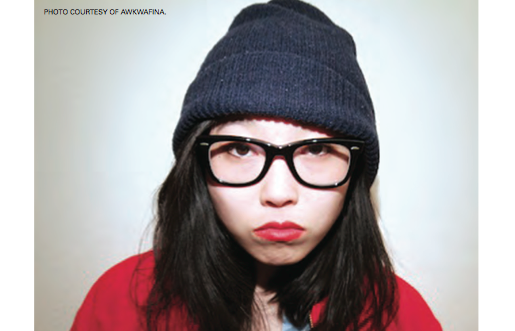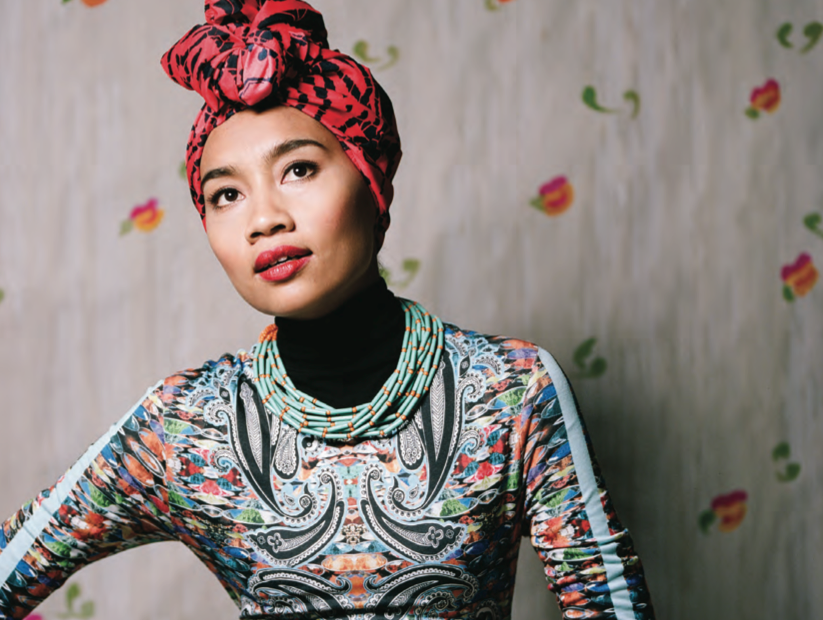Story by Ada Tseng.
In so many ways, music defines a generation or a culture, giving us the soundtrack to our multilayered, bicultural landscape. And the 10 women we highlight here not only lay it all on the line and bare their souls in their music but, each in their own way, do much to round out a picture of what it is to be an Asian woman in America. Our cover girl Yuna defies the modern definition of pop star with her inimitable voice juxtaposed with a girl-crush-worthy style of chic turbans and covered-up ensembles. We have the gossamer voiced Priscilla Ahn, whom we feel like we’ve grown with as her life journey (and music) goes from melancholy to bliss. Then there’s the flame-haired Hmong American hard rocker and an indefinable artist whose voice is featured in one of the hottest hits of the year. From sweet little ditties to feminist anthems, from odes written in the throes of love to songs that feel more like a cathartic purging, their music moves us, inspires us, rocks us. Take a glimpse into the meaning and memories behind the melodies.
Nora Lum – the Chinese- Korean American rapper known as Awkwafina, who in 2013 made a name for herself with her viral hits “My Vag” (a response to Mickey Avalon’s 2006 song “My Dick”), “NYC Bitche$” and “Mayor Bloomberg (Giant Margaritas)” – admits that her catchy moniker doesn’t really mean anything. She chose it mostly because it sounded ridiculous as a rap name. “I always think it’s hilarious when companies attempt to feminize a product,” she says, “and I always knew that Awkwafina wasn’t a rap game name where people would be misled about the kind of music [I] would be making.”
As a kid growing up in Queens, N.Y., Lum, 25, was influenced by the musical tastes of her Chinese American dad (Bob Dylan, Townes van Zandt), and she started her musical journey playing trumpet, inspired by the likes of Chet Baker and Louis Armstrong. Though she never intended to become a rapper, nowadays, she’s drawing attention with her funny, provocative and very share-able videos, while also being respected for her beats, rhymes and tongue-in-cheek delivery. Her debut album Yellow Ranger (also the title of one of the tracks) was released in February.
First Song: I think the first song I ever wrote (and actually sang and recorded) was when I was 15 around Christmas. I had this holiday songbook for my trumpet with an instrumental background CD. Basically, it was a really lowbrow, raunchy cover of “Jingle Bell Rock” that I don’t have to go into right now.
[wp_ad_camp_2]
Inspiration for Her New Single “Queef:” There were literally tiny drunken cherubs farting out light when I had this idea. It came out of nowhere. Basically, I had this (almost spiritual) vision of a woman being endowed with superhero powers that manifested into earth-shattering queefs [slang for vaginal flatulence]. Unfortunately, the vision didn’t quite continue into what would actually happen once she had the “queefage” or how it would help fix the world’s problems.
Why Yellow Ranger: When I was young, I played Power Rangers with all my friends and remember feeling angry when people said I should play Trini [the Yellow Ranger]. I always wanted to be Tommy or Jason, or Kimberly if I had to pick a girl. Trini was seriously lame to me as a kid. But as an adult, the connotations Trini carried with her seemed less offensive and (as much as I detest the word) empowering.
On Being Labeled a Feminist Icon for Songs like “My Vag:” I minored in women’s studies in college, so it would be wrong of me to deny knowledge about the importance of female visibility in certain industries. At the same time, I think it’s also important for people to understand that rapping about vaginas is something I do because I own one. Rapping about being a woman is something I have to do by default because I’m also not a heterosexual man with a penis. I think that making songs that bring up blush-worthy content can be easily confused as either aggressive, rogue feminism or being a girl without a social filter at parties. At the same time, I am proud that my music has been embraced by other women and celebrated as something good for feminism.
Wanna hear “My Vag?” Go to charactermedia.com/awkwafina.
This story was originally published in our Spring 2014 issue. Get your copy here.






